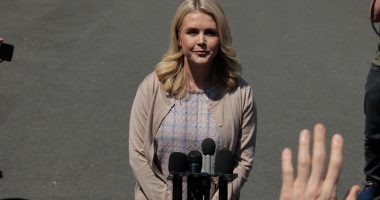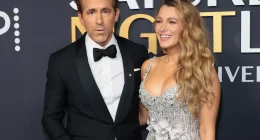We are in the health visitor waiting room. Our daughter Thea, a few weeks old, is burbling to herself on my lap while we struggle to keep our eyes open.
There are three other babies also here for their check-ups but we are the only couple in the room and I feel the other mothers’ eyes on us. When it’s our turn, we go into the room for Thea to be weighed and measured.
We’re exhausted. We have no family nearby to help out and are hoping to get some much-needed advice and support with breastfeeding, managing the day-to-day and some reassurance that we will, indeed, sleep again.
Instead, the health visitor looks at us and says, ‘Who is the mother?’
‘We both are,’ we say and the look of disdain, of confusion, of frustration, almost jumps off her face. ‘But who is the real mother?’


It took me years to feel secure enough to say ‘I’m Thea’s mum’ and not append it with ‘but I didn’t give birth’ as if the other person would somehow know. Pictured: Beth, right, with her wife Jannine and their daughter Thea
She means who gave birth, of course, and my world crumbles.
My wife says she did, and from this point the woman directs every question, every look, every moment to her, even though her questions have nothing to do with pregnancy or birth.
I may as well not have been in the room.
My wife holds my hand while I hold Thea because she knows how much that comment hurt. I sit there mute, stripped of my voice by a few words. I have questions. I have information to add. But if I speak, I’ll end up crying.
I wonder how different that appointment might have gone had I been a man. A father has a defined role in society and in a child’s life, but I wasn’t a dad and, by their definition, I wasn’t a mother, either. So who was I?
I was the ‘other mother’ and I didn’t know what that meant.
It took me years to feel secure enough to say ‘I’m Thea’s mum’ and not append it with ‘but I didn’t give birth’ as if the other person would somehow know.
The challenge of childrearing was was made far worse by the challenge of finding my own place in that process, one I had to fight for.


A father has a defined role in society and in a child’s life, but I wasn’t a dad and, by their definition, I wasn’t a mother, either. So who was I?
My wife Jannine and I had been together for around eight years when we decided we wanted to have children.
I imagine that talk went the same as it does for most couples. We loved each other, we both had good jobs in publishing and knew we could provide a loving home for a child.
But still, for two women it’s a strange conversation, less ‘let’s try for a baby’ and more ‘let’s spend thousands of pounds to have a 32 per cent chance of having a baby’.
The first question is always, who is going to carry?
It was an experience Jannine really wanted, whereas I could not picture myself pregnant, so for us, an easy decision.
We went for a consultation at the London Women’s Clinic, who treat a lot of same-sex couples, and have one of the highest success rates in the country.
Our experience with them was wonderful. Even though I wasn’t the one getting scans and blood tests and ultimately pregnant, they never made me feel any less important.
I naively expected this attitude to carry through throughout the pregnancy and birth. I was wrong.
After a year of IVF, seemingly endless scans, and a bout of heartbreak following a miscarriage, Jannine became successfully pregnant and at eight weeks we were discharged from the clinic into the care of the NHS.
Again, this was a largely wonderful experience. The midwives were attentive and kind, but even in leafy, welcoming Raynes Park, South-West London, our future family structure was absent from any pamphlet, poster, or pinboard. I wasn’t a part of the parenting journey.


Carrying a child was an experience Jannine really wanted, whereas I could not picture myself pregnant, so for us, an easy decision
In 2019 there were 212,000 same-sex couple families in the UK, around 12,000 of whom have children, up from 4,000 in 2010. We are the fastest-growing family type, but this reality is not reflected in the information available — and, sadly, the way you can be treated.
In the antenatal class we attended, I was the only woman in the ‘Dads’ group so was constantly referred to as a dad. Sometimes, if the instructor remembered, it became ‘Dads and um, partners’.
I smiled through it, as you do, but instead of reassuring a new and nervous parent, everything about the journey to parenthood made me feel like I didn’t belong on the trip. Inevitably, it meant that from the start I felt less of a parent.
At one of the scans the nurse said to my wife, ‘Your sister can come in if you like.’
When Jannine and I were out, people would coo over the bump, while I was ignored, assumed to be a friend.
Once, when I was buying some baby clothes, the cashier and I started chatting. I said my partner and I had another week of freedom before the baby arrived and he looked at me, decidedly unpregnant, and frowned. I could see the confusion in his face and my heart sank.


When Jannine and I were out, people would coo over the bump, while I was ignored, assumed to be a friend
Read Related Also: Davido replies journalist who questioned him for not singing about the death of Ifeanyi in his new album
He forced a smile, rung up the items and I left, feeling a mix of shame and anger that I’d let something like that upset me.
I made myself useful in other ways. I am a planner and made lists, bought all the clothes, decorated the nursery, bought and assembled the cot, researched the best bottles, formula and sensory toys. I turned myself into an encyclopaedia of parenting knowledge to hide the fact I didn’t feel like I was one.
I worried about how I would have that special mother-daughter bond with this gorgeous little creature if I hadn’t given birth to her.
Would she want me for comfort? Would she always go to Jannine if she fell down or wanted a snack? Would I be as invisible to my daughter as I was to society?
When I tried to find information on mother-child bonding, it didn’t account for me as it talked largely about breastfeeding. There are no resources out there for women like me, nothing to reassure us.
The book I wish I’d found at the time was comedian Jen Brister’s memoir The Other Mother. It’s a hilarious and frank look at being a gay parent, but really that’s the only book I’ve seen that speaks to the experience.


My wife is an incredible woman who has been nothing but supportive, empathetic, and alive to my feelings during this time
Even now, with my daughter about to turn four, I’m reminded how invisible I am. Her nursery is great and at no time have we been treated any differently by them, but the subject of alternative families has never come up as a topic for age-appropriate learning in her nearly two years there.
Feeling as though I have no part in the parenting process has given me the worst imposter syndrome of my life.
I struggled a lot during that first year, often feeling more like an over-enthusiastic aunt or a friend who was there to helicopter around the edges while the real mum did her job. I would break down crying every time Thea wanted my wife for a cuddle instead of me. I would hold in the tears every time a family member told us she looked just like my wife.
I used to love taking her out by myself because people would assume I was her mother. I was out with her once and someone said she had my smile and I laughed and thanked them but knew they were lying because that was impossible.
I was always scared that Thea would start crying and I wouldn’t be able to soothe her and people would think I was doing something wrong.
What I realise now was that my logic was skewed.
I somehow expected the process of growing a human in your uterus to give a woman an innate sense of what to do with the baby once it came out. Spoiler: it doesn’t.
I also assumed bonding was a biological response made of shared DNA and physicality. My wife grew our daughter in her body, so of course she was going to have a stronger bond than I was. But was that really true?
In fact, it turns out bonding with a child has absolutely nothing do to with biology or birth, but instead how much time and attention you give them.


Once, when I was buying some baby clothes, the cashier and I started chatting. I said my partner and I had another week of freedom before the baby arrived and he looked at me, decidedly unpregnant, and frowned. I could see the confusion in his face and my heart sank
When I dived into the research, I discovered DNA isn’t a mystical force that makes a connection with a child deeper or more meaningful. The bonding hormone oxytocin can be triggered in babies and adults by emotional support, reassurance, and physical contact — from anyone.
If a non-biological parent gives the same level of affection and attention to their children, their bond will grow in the same way as that of a biological parent.
Once I discovered this, everything changed. I had the chance to have just as strong a mother-daughter bond as my wife did.
If this information had been made available to parents in my position, perhaps in an antenatal class, perhaps by a health visitor, it would have saved me months of heartache and depression.
My wife is an incredible woman who has been nothing but supportive, empathetic, and alive to my feelings during this time. She has done everything she could to make my experience joyful and inclusive and I thank her every day for that.
But still it took me nearly a year until I felt like a real mother.
I certainly felt better at six months when my wife stopped breastfeeding and suddenly there was no difference between what we were capable of in regard to our daughter.
That felt like a weight had been lifted off my shoulders and my confidence began to grow. I loved to do her nightime bottle feeds instead and didn’t even care how tired I was.
Indeed, the first time I ever did it was also the first time I felt like a true mum. She was a slow feeder, and as I sat there cradling her for half an hour, I watched her eyes gently close until she was fast asleep in my arms. It was the most joyful of moments, and after that, our bond grew quick and strong.
I loved every time she would scoot to me, the huge smile when I’d get home from work, the times she reached for me when she bumped into something or grew grisly with tiredness.
I love to cook and Thea loves to eat so we became kitchen buddies. There is a song only I sing to her. We found our own jokes and games, just as Jannine did, and thanks to lockdown we were both there when she took her first steps and said her first words.
I still have moments of doubt, when the spectre of imposter syndrome rears its ugly head again and I am reminded of those early months of emotional turmoil.
But when it happens, I think of all the smiles and laughs and hugs and the feeling fades again.
My daughter is starting school soon and to her there is no difference between her mummy and her mumma. She knows she grew in her mumma’s belly, but doesn’t care. I give the best cuddles. Jannine plays the best games. We both tell the best stories.
My daughter knows that she is loved and that’s all that matters. I am her mother, no ifs or buts or qualifiers. No ‘other’.
- Children Of The Sun by Beth Lewis (£18.99, Hodder) is out on May 25.








